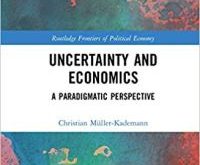from Blair Fix and RWER issue #90 Is it obvious to you that humans are evolved social animals? Is it also obvious that our sociality is central to how we distribute resources? If you think so, you’re probably not an economist. Through years of schooling, mainstream economists are trained to ignore the obvious facts about human nature. The theories that economists learn make it impossible for them to understand human sociality. Economists are trained that humans are asocial “globules of...
Read More »This is scary . . .
Via Noah Smith . . . A relative of mine from China just sent me this. Rows of police surrounds her residential block where a positive #coronavirus case was found. It was someone who returned from #wuhan. Now their entire family has been taken away. The whole block is now sealed off until 16th Feb. pic.twitter.com/N3GulTWDlh — Maree Ma (@maree_jun) February 2, 2020
Read More »Open thread Feb. 1, 2020
Models and evidence in economics
from Lars Syll Analogue-economy models may picture Galilean thought experiments or they may describe credible worlds. In either case we have a problem in taking lessons from the model to the world. The problem is the venerable one of unrealistic assumptions, exacerbated in economics by the fact that the paucity of economic principles with serious empirical content makes it difficult to do without detailed structural assumptions. But the worry is not just that the assumptions are...
Read More »If democracy fails in the United States . . .
will it survive anywhere else? Many people (including me) are worried about the failure of democracy here. But what happens in the rest of the world if democracy fails here, with the leading countries outside Europe authoritarian or leaning authoritarian, and European democracy looking a bit frayed around the edges? And if authoritarianism is ascendant around the world, what would be the chance of a democratic restoration here? This is above my pay...
Read More »My “official” first half forecast for 2020
by New Deal democrat My “official” first half forecast for 2020 My short term 6 month forecast has been posted at Seeking Alpha. As usual, clicking over and reading should be educational for you, and puts un poco dinero in my pocket.
Read More »The WHY of crazy models
from Asad Zaman I was professionally trained as an economist, and learned how to build models with the best. As described in detail in a previous post on “The Education of An Economist“, it was only by accident that, a long time after graduate school, I learned of glaring conflicts between the theory I had been taught, and the historical evidence about effects of free trade and trade barriers. Further exploration along this direction dramatically widened the chasm between the economic...
Read More »Technology, patents, and inequality: an explanation that even economists can understand
from Dean Baker It is popular for people, especially economist-type people, to claim that technology has been a major driver of the increase in inequality over the last four decades. This view is very convenient for those on the winning side of the inequality divide, since it implies that the growth in inequality was largely an organic process independent of government policy. Inequality might be an unfortunate outcome, but who would be opposed to the advance of technology? However...
Read More »Three analytical questions that do not arise in standard neoclassical economics
from Herman Daly and RWER issue #90 Regarding quantification ecological economists distinguish growth from development. Growth is increase in size by assimilation or accretion of matter – it is quantitative. Development is qualitative improvement in design, priorities, or purpose. Growth is easier to measure than development, but development is more important for the future. Sustainable development, so-called, is qualitative improvement without quantitative growth in scale beyond...
Read More »Uncertainty in economics
from Lars Syll Not accounting for uncertainty may result in severe confusion about what we do indeed understand about the economy. In the financial crisis of 2007/2008 the demon has lashed out at this ignorance and challenged the credibility of the whole economic community by laying bare economists’ incapability to prevent the crisis … Economics itself cannot be regarded a purely analytical science. It has the amazing and exciting property of shaping the object of its own analysis. This...
Read More » Heterodox
Heterodox


